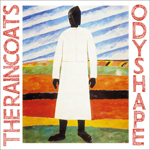|
|
 |
Dusted Reviews
Artist: The Raincoats Album: Odyshape Label: We ThRee Review date: Sep. 15, 2011 |

|
|
|
 |
The label “post-punk” is used a lot to describe bands that lift sounds from early ’80s LPs, put out a couple records, and then fizzle out. These bands aren’t necessarily inconsequential, but the fact that they try to sound like something that has already happened suggests that they don’t get what was great about post-punk in the first place. It wasn’t a movement or a sound, but a moment and a mindset, when rock broke open and anything seemed possible. The Raincoats were the first post-punk band, and Odyshape is one of the great post-punk records.
The Raincoats were born out of punk, but they didn’t really play punk rock. Ana da Silva and Gina Birch were a couple of art students who were smitten by the likes of The Clash, X-Ray Spex and Patti Smith. They took the notion that you didn’t have to already know how to be schooled musicians or Cosmopolitan hot to make music, and ran with it in the best possible way — first by learning how to play on stage in the company of some like-minded pals (violinist Vicky Aspinall stuck around), then by coming up with a great set of songs that knocked aside tired conventions about how emotions and gender were portrayed in rock ‘n’ roll. The Raincoats kicked rickety ass, tickled funny bones, and pulled on a few heartstrings, but after its release the band started burning through drummers and buying exotic instruments in junk shops.
The songs that da Silva, Birch and Aspinall wrote on those instruments, then set about rehearsing with their Rough Trade label-mates Robert Wyatt and Charles Hayward (of This Heat), displayed a wider set of influences. There was reggae, African drumming, and Asian singing. The Raincoats transcended their hard-won competence on their regular instruments by experimenting with those new purchases and anything else they could borrow. When they pulled it all together in the studio, the music didn’t really sound like anything else going around — it still doesn’t. The bass booms dub-wise, but threads winding melodies rather than adhering to a pulse. The guitars and percussion chatter back and forth, each instrument a small but assertive presence like a speaker in an ensemble play. The mix upsets the hierarchy of conventional rock by putting little percussive sounds over the guitars and kit drums, like something Lee Perry might have mixed in his Black Ark heyday.
And while the three women take turns singing lead, they don’t sound like they’re dominating their songs. The singing sounds wayward, even more so in this age of Auto-Tune than it did in 1981, but real and approachable. There’s a catch in da Silva’s voice on “Shouting Out Loud” that captures the spread of anxiety from the raving souls outside to the lonely narrator huddled in her room, but it’s hardly a sign of weakness. The way Birch mulls over the connections between spiritual, intellectual and physical experiences on “Dancing In My Head” feels quite intimate, but never pornographic. The Raincoats’ vulnerability is communicative, not manipulative. Kim Gordon puts it well in her liner notes: “They seemed like ordinary people playing extraordinary music.”
Gordon wrote those words in1993, when Sonic Youth and Nirvana were both signed to Geffen Records. Although Kurt Cobain successfully badgered DGC to put The Raincoats’ catalog out on CD, the trio’s music — especially the first record — resonated more with what was happening on labels like K and Kill Rock Stars. Odyshape didn’t sound like anything else going on back then, and even less so now, on the event of its reissue by the Raincoats’ own We ThRee label. Vampire Weekend might borrow from African styles, and dub effects have become so ubiquitous that even the Cirque De Soleil pit band uses them, but none of that stuff feels personal the way Odyshape does. No one else could have made it but these people, at that time; more than ever, it’s one of a kind.
By Bill Meyer
|







